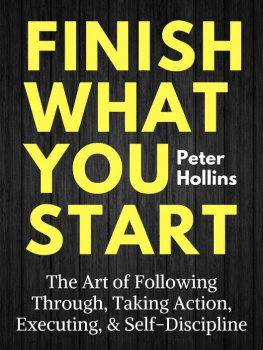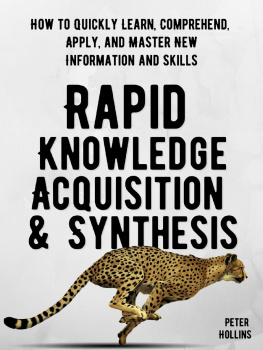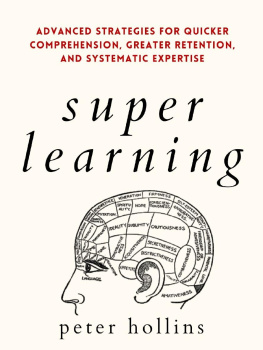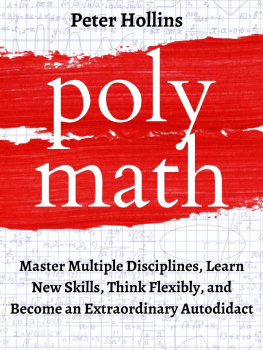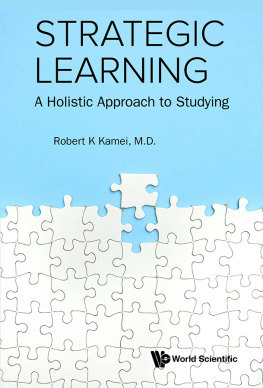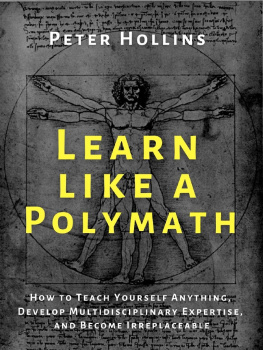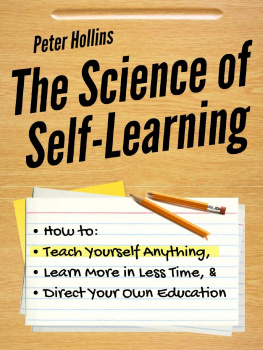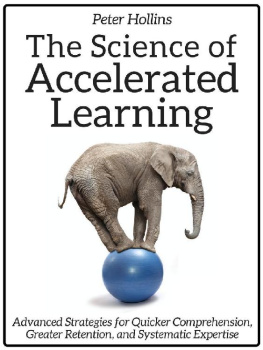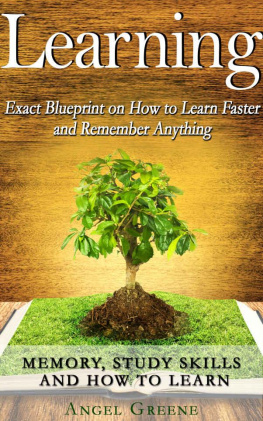The Self-Learning Blueprint:
A Strategic Plan to Break Down Complex Topics, Comprehend Deeply, and Teach Yourself Anything
By Peter Hollins,
Author and Researcher at petehollins.com
< < CLICK HERE for your FREE 14-PAGE MINIBOOK: Human Nature Decoded: 9 Surprising Psychology Studies That Will Change the Way You Think. > >
--Subconscious Triggers
-- Emotional Intelligence
-- Influencing and Analyzing People
Table of Contents
Chapter 1: A Self-Learning Plan
The Myth of Requirements
Macro and Micro Planning
Chapter 2: The Four Pillars to Self-Learning
Transform and Synthesize Knowledge
Combine the New with the Familiar
Self-Testing and Retrieval Practice
Absorption Requires Space
Chapter 3. Tactics for Learning
Managing Your Attention Span
Pomodoro and Friends
Change Locations
Construct Vivid Imagery
The Question Master
Chapter 4. Navigating Obstacles and Failure
The Procrastination Cycle
Academic Buoyanc y
Productive Failure
Inspiration Through Failure
Summary Guide
Chapter 1: A Self-Learning Pla n
Imagine youre starting a business. Youve found a great product, and youre certain the market is going to go crazy for it. All your friends have agreed that they would definitely buy your product. Even better, a Google search shows that no one else has had the idea to sell this particular product. Youre going to be rich . You start browsing private yachts online. The same friends say that you are being premature , but you dont know what that word means so you ignore them .
Excited by the opportunity, you build a website, buy loads of your product to keep up with your predicted demand, and prepare to ship your goods to customers. All you need to do now is buy some advertisements and wait for the orders to roll in. Business is easy why dont more people start their own company?
But of course, things take a wayward turn. You are shocked to see your website advertising costs far exceed your income. Every month you are losing money, and you have made only one sale. That sale was later returned for a refund. There was never any demand for your product, your friends lied to you to be nice, and the product itself was ludicrous.
Why did you find yourself in this position, and could it have been prevented?
Proficient businessmen dont just come up with a great idea and cash in. They study and learn far before ever taking action, and when they do take action, they act in ways they know will produce the profit they seek. The failure here wasnt just one of marketing or website design; it was a failure to understand the process of self-learning and how it contributes to anything novel or new in your life. This was a high stakes situation with a lot of investment, and you set yourself up for failure by not taking the initiative to self-learn. In reality, the ability to teach yourself both simple and complex information is the silent determinant of whether you ever get from Point A to Point B.
Sadly, its often only after failure does it occur to look to mentors, classes, books, or even podcasts to determine what we do wrong and how we can succeed next time. With business people, this lets them learn to analyze markets, giving them a fair idea of whether their product will be met with open arms or ignored entirely. They also learn about different methods of advertising, allowing them to reach exactly the niches they need for their product to take off. Imagine if you had understood this to be part of the process before you opened your wallet and flushed money down the toilet. Of course, learning on the job and in the moment is also fine, but the skill of learning still must be cultivated .
Now imagine another scenarioyoure learning to play guitar. You dont want to be a rockstar, but playing some songs around a fire on camping trips with your kids sounds like a fun way to bond and pass the time. You pick up a guitar, spend some time strumming, and are amazed by the cacophony that can emanate from a single relatively small stringed instrument. After thoroughly annoying the family youre trying to please, you decide that you need some help.
After considering your budget and the time you have available to learn, you decide that YouTube videos and websites are the best way to learn. You set aside twenty minutes after dinner as learning time, and devote yourself to understanding chords and strumming techniques. You make sure to understand the scales and theories before delving into more complex songs.
In no time at all, you can read music well enough to play campfire songs and even add in some new riffs of your own. Because you set aside time and properly expended the effort needed to learn something new, you gained the ability to amuse yourself and entertain your friends and family. There are considerably lower stakes here, and yet, far different results.
In both examples, the key to success was the arduous process of self-learning. It can feel tedious or even impossible because you will have no idea where to start. But this stage of discomfort and confusion must be traversed for anything new in your life. You can consult experts and learn from instructional materials. You can also create your own curriculum based on the knowledge gap between where you currently are and where you want to be. What matters is that by putting time and energy into acquiring new knowledge and mastering new skills, you can get to exactly where you want to be. And once youre there, new doors will open as well.
Both of our examples produced a profitone was monetary, and the other was social, but both acts of learning led to a net increase in quality of life for the learners. All it took was time, effort, and the willingness to apply the knowledge gleaned from expert sources.
Self-learning is what unlocks our potential in every aspect of life. However, if it were an easy task, everyone would be exactly where they want to be. Its not comfortable or easy. How we learned to learn as children is rarely the best real-life approach. The prospect of creating your own strategy and plan can be overwhelming. And whoever said it was supposed to feel like you arent working?
In addition, it turns out there are quite a few mental blocks people have surrounding self-learning that arent even about the process itself. They begin with the various myths, which typically amount to the statement, You need X to learn, and if X is not present, you are forever doomed. These myths keep many people from even getting started onto the path they desire. Its worth spending some time to dispel these myths so we can dive fully into learning afterwards without any reservations .
The Myth of Requirements
Many myths are empowering and serve as points of inspiration. For instance, the ancient Greek myth of Perseus slaying the snake-haired Medusa to serve as a rallying cry that the impossible is actually quite possible.
Unfortunately, that is not the case with learning. Mostly, learning myths serve to create perceived barrierssuch as a certain style, a certain formula, a certain motivation, even, are necessary to effectively think and learn. From the myth of innate learning styles to the falsehood that intelligence quotient (IQ), and thus intellectual capacity, is stable throughout life, many consider themselves to be stuck where they are. None of that is true, and there are no real prerequisites besides having an intention and some self-discipline. This section is about debunking those disempowering myths and allowing yourself even the possibility to get started to learn.


